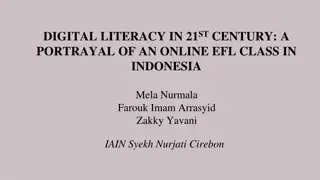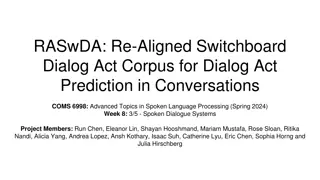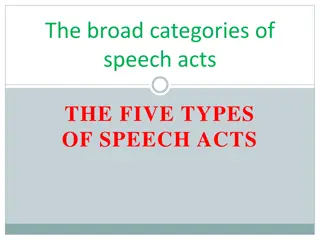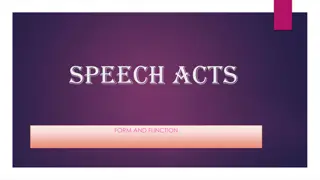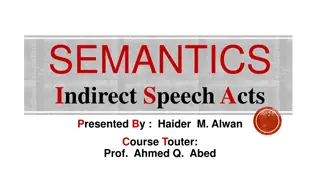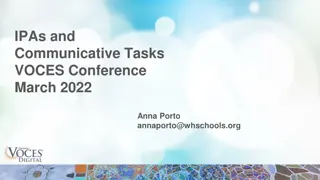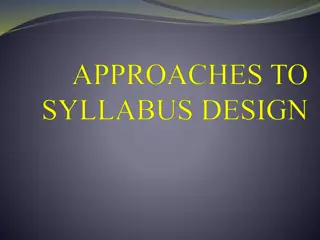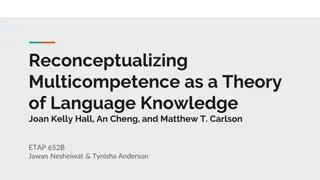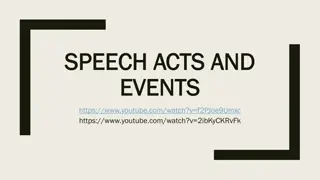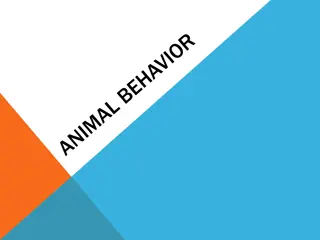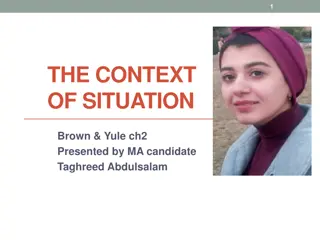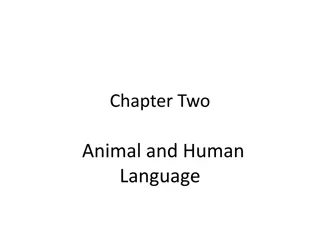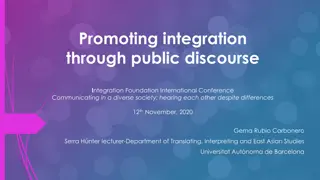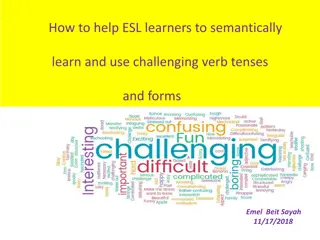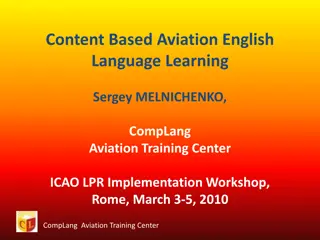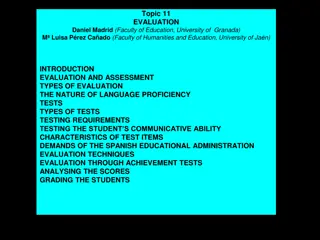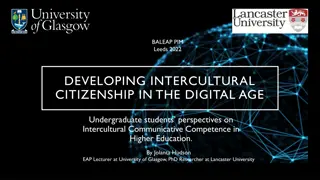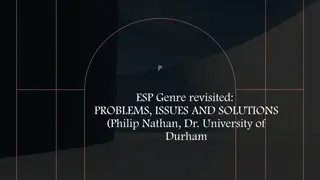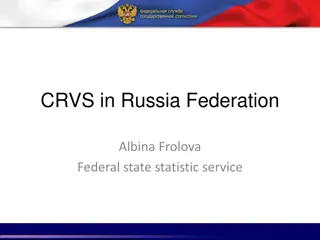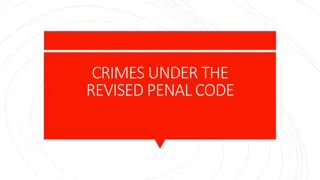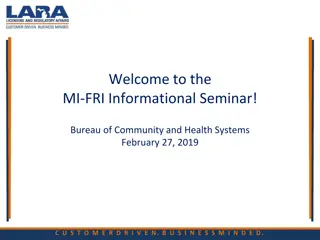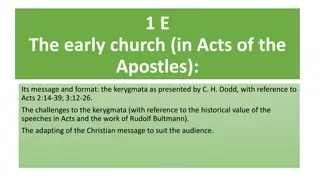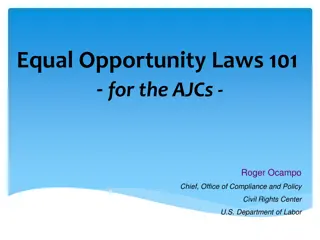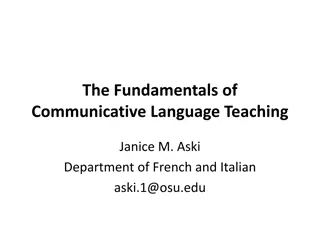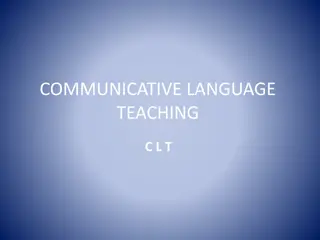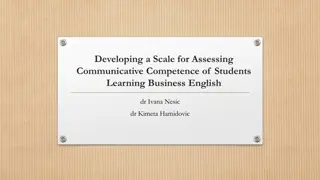English Language Teaching MODULE III
The different methods of language teaching, including Grammar Translation, Direct, Audio-Lingual, Audio-Visual, and Communicative approaches. Learn about their characteristics, advantages, and disadvantages.
3 views • 33 slides
Community Language Learning
Community Language Learning (CLL) involves collaborative language learning where teachers act as counselors and learners work together. CLL teachers aim to teach communicative language skills, foster self-learning, and mutual learning among students through valuing thoughts and feelings. Popular
2 views • 14 slides
Exploring Digital Literacy in Online EFL Classes at an Islamic Junior High School
The research delves into the implementation of digital literacy skills among students in an online EFL class at an Islamic junior high school in Indonesia. Utilizing various digital tools and applications such as WhatsApp and Zoom, both teachers and students incorporate cultural, cognitive, communic
0 views • 12 slides
Understanding Dialog Acts in Spoken Language Processing
Dialog acts encompass the communicative function and semantic content in conversations, influencing cognitive states and context. They have multiple realizations and interpretations, impacting dialog systems' language generation and recognition processes. Dialog acts play a crucial role in spoken di
0 views • 16 slides
The Five Categories of Speech Acts Explained
Speech acts are divided into five categories: Verdicatives, Exercitives, Commisives, Behavitives, and Expositives. Verdicatives involve giving a verdict, Exercitives give a decision on a course of action, Commisives involve committing to an obligation, Behavitives are used in communication activitie
1 views • 10 slides
Understanding Speech Acts and Politeness in Linguistics
This informative content explores the concepts of speech acts, including direct and indirect speech acts, and the role of politeness in communication. It highlights how speakers convey intentions through their utterances, distinguishing between different speech acts such as requesting, commanding, a
1 views • 11 slides
Exploring the Role of Novels in Teaching English Proficiency
Utilizing novels in English language teaching offers authentic and engaging cultural material, enhancing linguistic and communicative skills development. The shift towards cognitive methodologies has highlighted the significance of literature in creating meaningful learning contexts. Despite challen
1 views • 40 slides
Understanding Indirect Speech Acts in Semantics
Speech acts can be direct or indirect, with indirect speech acts relying on implicature rather than literal meaning. This concept can lead to confusion, especially in cross-cultural communication. Explore the theories of J.L. Austin and John Searle regarding speech acts and performative utterances,
1 views • 16 slides
Enhancing Language Proficiency Through IPAs and Communicative Tasks
Explore the integration of Integrated Performance Assessments (IPAs) and Communicative Tasks in language teaching, focusing on building student proficiency in reading, listening, speaking, and writing. Discover practical tips for implementing and managing IPAs, along with engaging communicative task
1 views • 16 slides
Understanding Language Teaching Syllabus: Integration, Theory, and Approaches
Language Teaching Syllabus involves the integration of subject matter and linguistic elements, guided by theories of language and learning. Various approaches like Grammatical, Situational, Communicative, and Analytic are used to structure syllabi. Breaking language into parts aids in sequential lea
1 views • 28 slides
Understanding Multicompetence Theory in Language Knowledge
Multicompetence theory, as proposed by Vivian Cook, describes a unique state of language knowledge where bilinguals exhibit enhanced cognitive abilities compared to monolinguals. Evidence shows bilinguals excel in tasks requiring linguistic analysis, divergent thinking, metalinguistic awareness, and
2 views • 13 slides
Understanding Speech Acts and Events in Communication
Speech acts and events play a crucial role in communication by impacting how utterances are interpreted. Speech acts such as apologies, compliments, complaints, and invitations are performed through utterances, with the locutionary act producing linguistic expression, illocutionary act conveying com
0 views • 30 slides
Understanding Animal Behavior: Instincts, Learning, and Social Interactions
Explore the intricate world of animal behavior, delving into instinctual reflexes at birth, learning processes such as habituation and conditioning, and the diverse types of behaviors animals exhibit, from sexual and maternal instincts to communicative and social interactions. Gain insights into how
0 views • 14 slides
Understanding the Importance of Context in Linguistic Interpretation
Linguists have increasingly recognized the significance of context in interpreting sentences since the 1970s. Contextual features, as discussed by scholars like Firth, Hymes, and Lewis, play a crucial role in understanding utterances within specific social and communicative settings. Co-text and the
0 views • 14 slides
Uniqueness of Human Language and Communication Contrasted with Animal Communication
Human language possesses unique properties such as reflexivity, displacement, and arbitrariness, setting it apart from animal communication. These distinctions enable humans to communicate abstract concepts, discuss past and future events, and use arbitrary linguistic forms. The contrast between hum
1 views • 17 slides
Promoting Integration Through Public Discourse: International Conference Insights
Public discourse plays a crucial role in shaping societal perceptions of diversity and integration. The Integration Foundation International Conference delved into communicative practices that both promote and hinder integration, emphasizing the responsibility of public communicators in constructing
6 views • 15 slides
Engaging Activities for ESL Learners to Master Challenging Verb Tenses
Enhance ESL learners' understanding and usage of difficult verb tenses through contextualized rules, interactive involvement, and fun communicative games. Explore challenging forms like past perfect vs. simple past and passive voice with practical examples and engaging activities.
0 views • 22 slides
Content-Based Aviation English Language Learning Overview
Explore the significance of content-based learning in aviation English language training. Delve into scenarios such as the Avro 685 Crash Landing, Midair Collisions, and communication challenges faced in radio telephony exchanges. Understand the importance of well-formed communicative competence and
1 views • 19 slides
Developing Communicative Competence in English Language Teaching
In English language teaching, the main goal of a communicative classroom is to foster students' communicative competence. This includes grammatical competency, sociocultural competency, discourse competency, and strategic competency. By focusing on these aspects, educators aim to enhance students' a
0 views • 7 slides
Interactive Design Workshop: Pine Tree Creation Using Design Thinking
Join us in an engaging design workshop where you will learn the principles of Design Thinking by drawing a pine tree on a Cartesian plane. Through activities like warming up, empathizing, ideating, defining, and prototyping, you will enhance your collaborative problem-solving skills while creating i
0 views • 14 slides
Evaluation and Assessment Techniques in Language Proficiency Testing
Evaluation and assessment in language proficiency testing involve systematic data gathering to assess students' communicative abilities. Different types of evaluation, such as formative and summative, are discussed along with techniques like observation, analysis of work, and creating situations to
0 views • 41 slides
Exploring Intercultural Competence in Higher Education: Perspectives from Undergraduate Students
Focuses on undergraduate students' perspectives on developing Intercultural Communicative Competence (ICC) in higher education during the digital age. The study delves into the importance of global citizenship, intercultural communication, and the role of digital tools in enhancing ICC. Byram's ICC
0 views • 17 slides
Ethical Considerations in Organ Donation for Neurologically-Aware Patients
This information highlights the process of honoring the desire of neurologically-aware patients to donate organs after circulatory death. It discusses the referral, legal authorization, triggers for consideration, and ethical aspects involved in approaching and discussing organ donation with the pat
0 views • 15 slides
Understanding Indirect Speech Acts in Communication
Indirect speech acts involve utterances that appear as simple statements but are intended to convey a different meaning such as requests or commands. This form of communication can be seen in various cultural contexts, requiring the listener to interpret the intended illocutionary force behind the w
0 views • 12 slides
Revisiting PESP Genre: Problems, Issues, and Solutions
This discussion revisits the problems and issues associated with communicative purpose and social purpose in ESP/Swalesian genre analysis. It delves into the definition and differentiation of communicative purpose (CP) and social purpose (SP), offering insights into their roles in text classificatio
0 views • 20 slides
Civil Registration of Acts in Russia
Civil registration of acts in Russia is governed by key legislation including Federal Law No. 143-FZ and involves the state registration of various events such as birth, marriage, divorce, and death. Bodies responsible for registration are formed by public authorities of the Russian Federation, with
0 views • 24 slides
Understanding Direct Bribery and Public Official Offenses
Bribery of public officials under the Revised Penal Code, specifically Articles 210 to 212, involves direct, indirect, and qualified bribery. Direct bribery encompasses acts where a public officer agrees to perform or abstain from acts in exchange for gifts, promises, or considerations. Offenses inv
0 views • 35 slides
MI-FRI Informational Seminar and MI-ACTS/LTCPP Development Overview
MI-FRI Informational Seminar hosted by the Bureau of Community and Health Systems highlighted the development and improvements of MI-ACTS/LTCPP, aiming to streamline Facility Reported Incidents submissions. The MI-ACTS/MI-FRI workgroup collaborated since 2014 to enhance the system's efficiency and u
0 views • 18 slides
Understanding Communicative Acts on Social Networking Sites
Exploring the taxonomy of communicative acts on social networking sites, this work delves into the impact of design features that influence speech acts, commitment, and normative pressures online. By analyzing common families of communicative acts on SNSs, the research sheds light on how these platf
0 views • 29 slides
Reflections on Catholic Education and Mercy in Light of Acts 17:15-18:1
Today's celebration of the Eucharist focuses on Catholic Education Week and emphasizes the call to love as people of mercy. Reflecting on the Acts of the Apostles passage, we are reminded of God's omnipotence and our identity as His offspring, called to seek and worship Him without idolatry. This se
0 views • 25 slides
Understanding Colonial Acts and Proclamations in Early America
Explore the series of acts and proclamations that shaped the relationship between colonists and the British Empire in early America. Learn about significant events such as the Proclamation of 1763, Navigation Acts, Sugar Act, Quartering Act, and Stamp Act, and understand why these measures sparked a
0 views • 18 slides
Early Church Message and Format in Acts of the Apostles: Kerygmata by C. H. Dodd
The early church's message and format in Acts of the Apostles, particularly focusing on the kerygmata as elucidated by C. H. Dodd, with references to Acts 2:14-39 and 3:12-26. Explore the challenges to the kerygmata and the adaptation of the Christian message to various audiences. Additionally, insi
0 views • 17 slides
December Daily Acts of Kindness for the Holiday Season
Spread joy this December by engaging in daily acts of kindness and festive activities. From decorating the Christmas tree to sharing a cup of tea with a loved one, each day offers a unique opportunity to bring cheer and goodwill to those around you. Embrace the spirit of the season with baking, play
0 views • 13 slides
Understanding Equal Opportunity Laws and Civil Rights Acts
This content covers the importance of enforcing equal opportunity laws and civil rights acts to promote justice and equality in various aspects of society, such as employment, programs receiving financial assistance, public accommodations, and education. It delves into the mission of the Civil Right
0 views • 46 slides
Exploring Communicative Language Teaching Fundamentals
Communicative Language Teaching focuses on real-life situations to facilitate meaningful communication. This approach aims to teach language through practical interactions, with a particular lesson goal being to learn how to greet, introduce oneself, and ask about others' names and origins. It empha
0 views • 23 slides
Principles of Communicative Language Teaching (CLT)
Communicative Language Teaching (CLT) emphasizes the importance of enabling students to communicate in the target language effectively in real-life situations. This approach focuses on developing linguistic competence and communicative competence to ensure learners can use the language proficiently.
0 views • 15 slides
Impact of Enclosure Acts on European History
Enclosure Acts in the United Kingdom led to the privatization of common land, marking a significant shift in English agriculture and society. Large-scale farmers and aristocrats capitalized on consolidation, leading to the loss of land for small farmers and disruption of the traditional agrarian way
0 views • 22 slides
Specialization in International Business Communication (SIBC)
Specialization in International Business Communication (SIBC) offered by the Department of Business Communication focuses on the critical role of communication in various business settings, emphasizing skills in language usage, communicative competence, and strategic language application. The progra
0 views • 11 slides
The Power of Friendship: Acts of Kindness and Support
In a world where someone cares, friendship holds immense power. Through acts of kindness, gentle touches, words of encouragement, and unwavering support, true friends demonstrate the essence of companionship. As highlighted in Acts 9:1-19 and John 15:15, the transition from servants to friends signi
0 views • 10 slides
Understanding Communicative Competence in Business English Students
Developing a scale for assessing communicative competence in students learning Business English involves understanding the models of communicative competence, the difference between communication and communicative competence, as well as the relationship between language knowledge and language use. T
0 views • 29 slides


